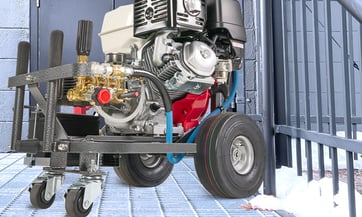With cold temperatures on their way in, protect your jetter
from seasonal changes
How you care for your equipment somewhat changes throughout the year. As the Northern Hemisphere heads into fall and winter, it’s time to start preparing for cold-weather conditions.
Jetters are particularly sensitive to environments under 32 degrees F because the hardware is in constant contact with water. These simple tips will help you prepare your jetter during freezing temperatures and protect your investment.
Protecting your jetter
 First, you need to remove all the water from the jetter hose every time you finish a job. If left inside the hose, the water can freeze and damage the pump system and stretch or even burst the hose. If you don’t want to come out one morning to find an iced-over jetter, there are a few ways to remove the water. Many sources suggest running 100-degree-rated RV antifreeze through your hose. Never use standard automotive antifreeze; it’s more caustic and can degrade the system. Another practical (and usually less expensive) option is to use window washer fluid. Regardless of which option you choose, always be sure you choose the right temperature rating for your area. RV antifreezes with lower temperature ratings will work, but they are thicker and may end up gumming up the hose.
First, you need to remove all the water from the jetter hose every time you finish a job. If left inside the hose, the water can freeze and damage the pump system and stretch or even burst the hose. If you don’t want to come out one morning to find an iced-over jetter, there are a few ways to remove the water. Many sources suggest running 100-degree-rated RV antifreeze through your hose. Never use standard automotive antifreeze; it’s more caustic and can degrade the system. Another practical (and usually less expensive) option is to use window washer fluid. Regardless of which option you choose, always be sure you choose the right temperature rating for your area. RV antifreezes with lower temperature ratings will work, but they are thicker and may end up gumming up the hose.
Note: antifreeze should be part of your jetter maintenance no matter the time of year.
Another option is to simply blow the water out of the line with compressed air. Connect a compressor or air tank to the valve on the pump head to push it out of the system.
If you’re using a gas-powered jetter frequently, you’ll also need to keep the fuel tank full during cold weather, much the same as you would with a vehicle.
Storing your jetter
Storage during the winter can be a dilemma for many plumbers and drain cleaners. Keeping your jetter protected from the elements as best you can is a vital part of extending the life of your equipment. Storing your jetter in a heated garage or other building is the best option, but a well-insulated shed with a space heater works as well. It keeps your motor, pump, and hose at a safe temperature to ensure nothing freezes, rusts, or breaks.
If you know you won’t be running your jetter for more than a month, there are a few additional things you should do to protect the motor or engine. Gas jetters need their fuel tanks and oils (in the engine and pump) drained. Don’t forget to keep the battery charged using a trickle charger, and if you’re storing long term, bring the battery indoors to keep it warm.
Using your jetter
You’ll also want to consider taking a few precautions when using your jetter as the seasons change. If you’re in extreme cold (below 32° F) preheat the holding tank and pump with hot water (don’t exceed 140°F) and cycle the machine. Keeping the water moving helps prevent freezing. And at the end of the day, remember to clear the water out of the system.
Keeping your equipment in top shape can feel burdensome, but damaged equipment is a danger to work with and costly to replace. It does take a little more effort, but it’s worthwhile to follow preventive measures.
To help you prepare for the cold weather:
- the MyTana Antifreeze kit is helpful if you have a M20 or M30 jetter
- for our MV84 or MV80 jetters, we have special kit, the MV84 Antifreeze Kit.



